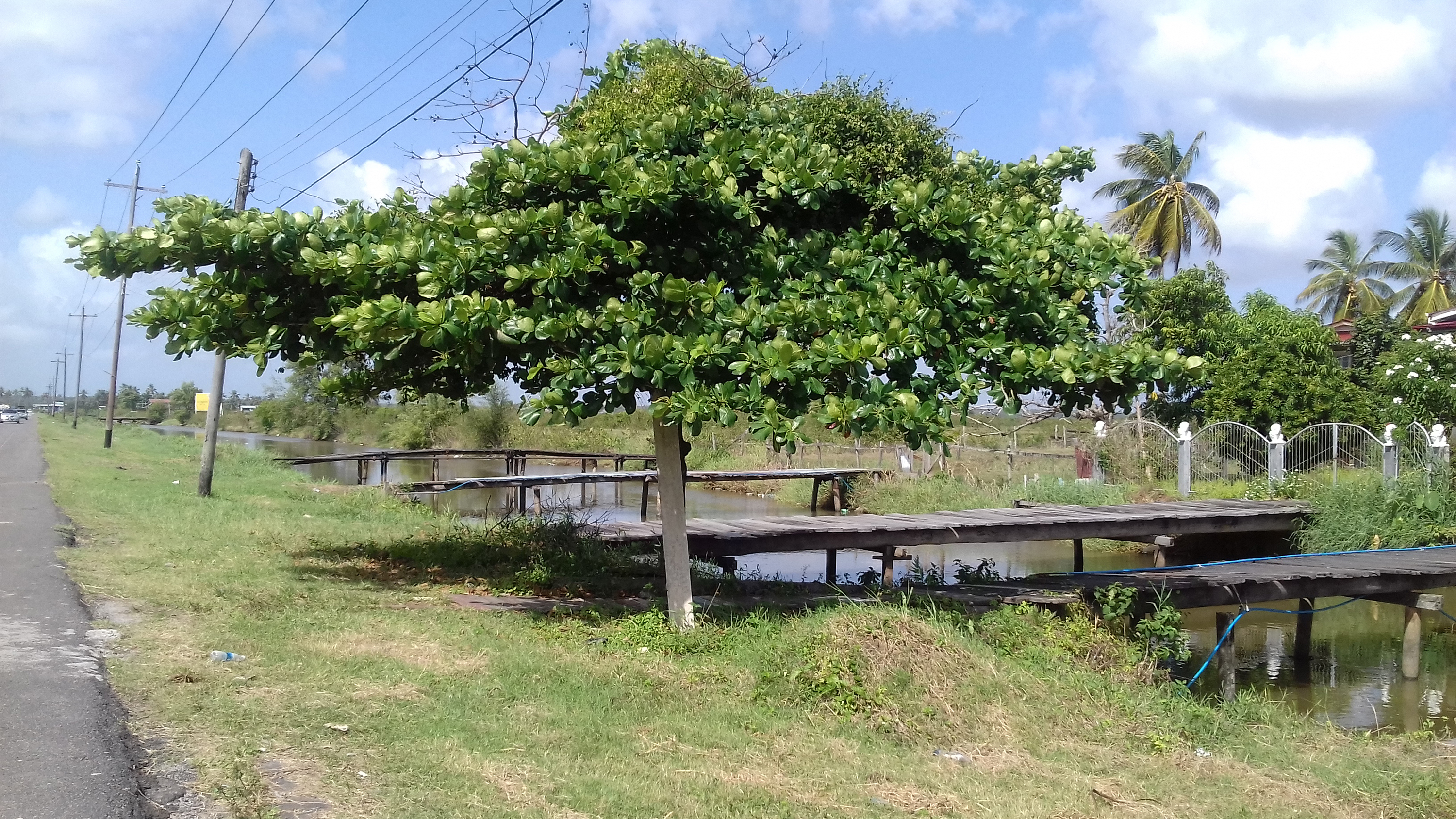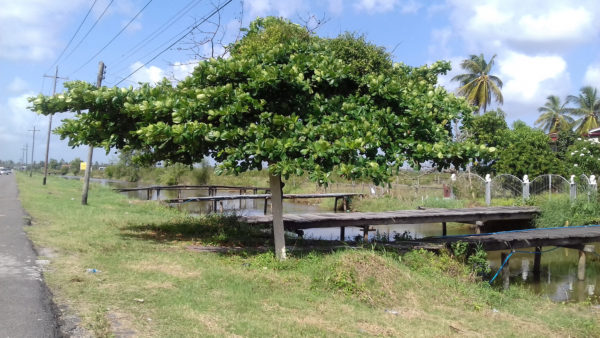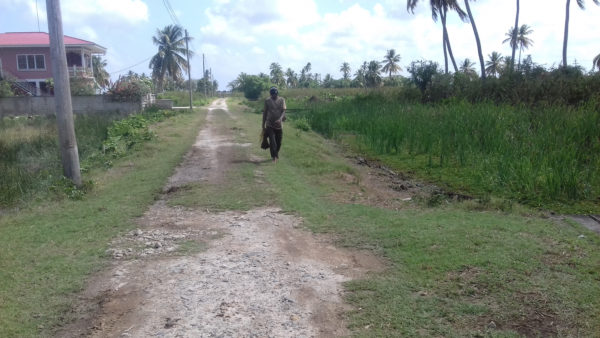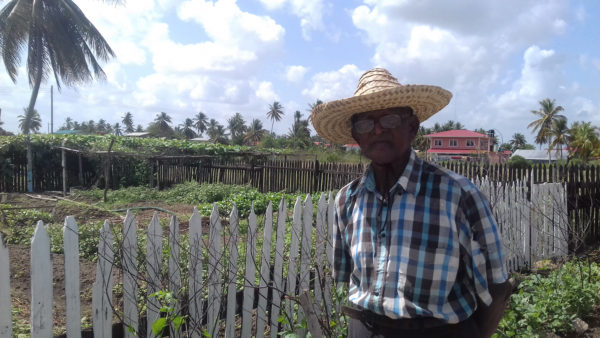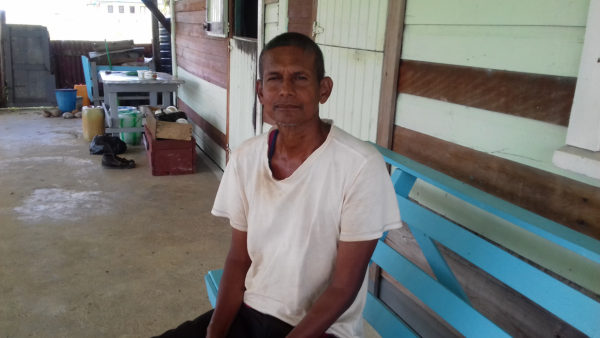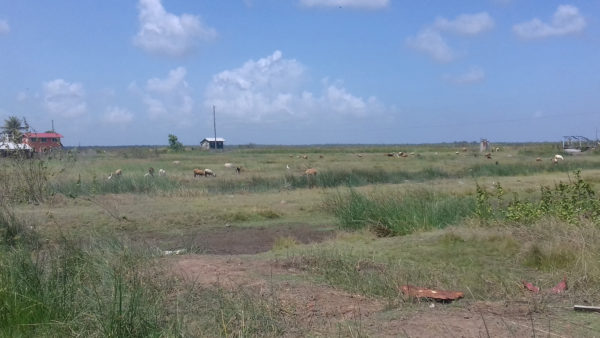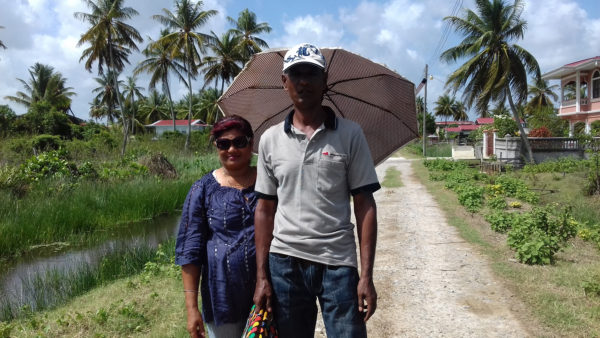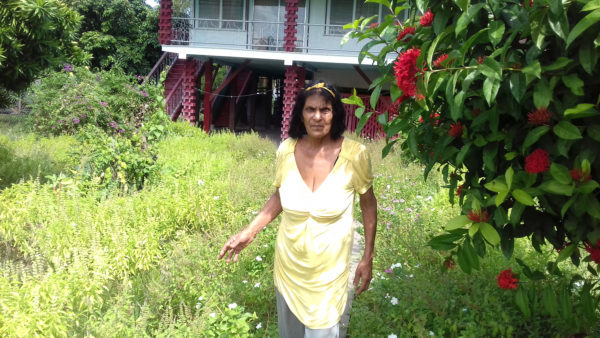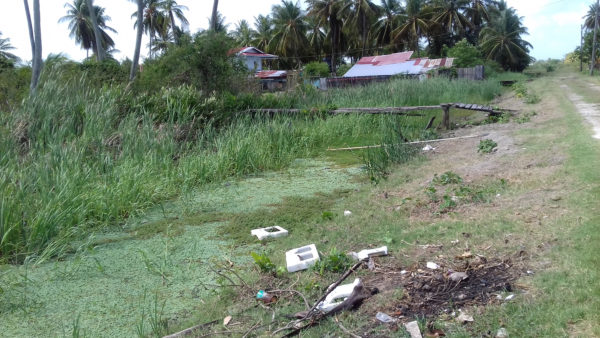With about only 30 houses in total, Number Seven Village could very easily not be noticed, although Berbicians traverse what is well known as the Number 19 Public Road umpteen times per day.
The World Beyond Georgetown began the journey to Number Seven Village from the Canje turn, but when told the destination, the driver asked, “Where is that?” It was only when he was told that it was the village after Seawell, that he caught on. “Oh wheh de bus shed deh next to the sign,” he affirmed.
Meanwhile, at the bus shed, there was no one in sight; it was as if all of the villagers had migrated out of the small, quaint village. The first sign of life was two traffic police officers sheltering from the blazing sun under a tree on the main road.
Rajmattie Jaikarran Babulall also known as ‘Aunty Bella’, lives in the first house in the village. “Me na get problem in this village,” she said. “Me na get water but me get light. Me live here like five years. Is a good village, me like it since me live here. Me move out from Rose Hall and come, here more quiet.”
However, she then stressed, “All about nice, man. You got to make am nice.” Babulall then explained that she is separated from her husband but noted that he resides opposite her. “He been big 30 years for me when we married,” the 68-year-old woman said.
Number Seven Village, which is located some two miles from New Amsterdam, has one church and one shop.
A couple who walked out to the bus shed to get transportation to go New Amsterdam to shop for the holiday season, told the World Beyond Georgetown that the village was best place to raise children. However, they complained about the drains not being dug regularly and the condition of the street. “This Number Seven Village, we a live here eleven years now and look them drains them na even a re dig them drains now,” said Jailall Jagmohan also known as ‘Ronald,’ He added, “about two year or more them drains na dig. Look them street, how them start to make it them street this na pass. Na mind how you talk to them is still same thing. It get people a mine animal here and when the animal climb from the drain them a bruk the edge.”
He then said, “The village is a quiet village it na get plenty houses, nobody don’t fight anybody.”
His wife Salima Jagmohan said she would love to have street lights in her street. She said the majority of villagers are married couples with a few children and teenagers. The couple giggled as they explained that they tied the knot 17 years ago.
The lone shop in the village does not sell everything, hence they need to travel weekly to New Amsterdam, “Me does take him to fetch the bag for me,” Salima stated.
At the head of the second street lives the star of the village, an eighty-five-year-old farmer. The pensioner who previously worked at the Rose Hall Estate as a cane harvester before retiring, definitely does not look his age; he said he also does nor feel it.
I spotted him sitting on a small bench in his garden. Before I could call out to him, he said, “Hey girl, what you doing here?” When I explained the purpose of my visit to the village, he immediately invited me in. Budhai Sukhoo explained that he has lived in Number Seven Village for over 50 years now. “I am a hard-working man. I always get money in my pocket,” the farmer said. “I plant little rice and mine a few cattle, so I am not a lazy man. I am a happy man. I always work. Watch, I working up to now.”
Noting that his family has moved away to the Unired States, he said, “I have a lady I living with, man.” He said the motto when he first moved into the village was, “hard working and happy living.” He explained that when he was fifty years old he migrated to the United States, but returned as over there never felt like “home”.
He said, “Everybody telling me I ain’t look like 85. I caring myself. Them young people wa want live long got to remember to care them self. I don’t know about the young and old, I was never old before 85 so I don’t know how 85 stay.”
When asked if he would want the village to expand he said, “Nah man, I like it so. It nice and cool. This is a quiet place we don’t have much waste people. All the people living here are hard-working people. It is a poor kind a village but people happy.”
Villagers are mostly estate workers and farmers. However, the World Beyond Georgetown was told that a nurse and a radio personality attached to the only radio station in Berbice also live in in the village.
Another villager who lives alone, said he used to reside in the house with his mother. However, the 78-year-old woman passed away two years ago. He explained that after his mother fell sick he quit his job as a water boy at the estate to take care of her. “I miss her a lot,” 56-year-old Mohan Seecharran Sookhoo said.
To support himself he said he “does weed a yard and clean and shake. Me sister does send money for me. Me never married; me does cook and clean and eat.”
Villagers also shared that they have never had access to landline phones, since there is no GTT pole in the village. “Them say that is too lil bit people so them na give abie phone,” they said. A few of the villagers said their Christmas wish would be to have a GTT landline phone.
Meanwhile when asked about their plans for the holidays, the villagers said, “Wa abie go plan? Abie na get money, wah abie go plan?”
World Beyond Georgetown noticed that there was a streetlight in one street and enquiring learnt that a villager’s son works at GPL, hence she placed a light on the pole and was paying the electrical bill. Although she was not at home at the time of our visit, her neighbours said, “I happy for that light wah she get there, at least night time when you got to come out late you get lil light.”
Meanwhile, the owner of the only shop in the village stated that business has declined tremendously as persons have been migrating steadily for the past year. “The population is very small and then people go away. The business na like before; people hardly a come buy,” she explained that she sells groceries and haberdashery, but persons tend to go to New Amsterdam since she does not sell in bulk. The woman who is fond of animals, owns five poodles. She said she has a list of names of people waiting to buy puppies from her. One of her poodles, Teddy, was to be picked up by someone all the way from Canal Number Two. She noted that she sold Teddy for $12,000. She explained that it’s expensive to take care of poodles, hence whenever they have pups, she sells them before getting attached to them.
The World Beyond Georgetown also met a fisherman who went to the backlands at the Number Seven Village to fish. He said he fished for an hour and was returning home with hassa to cook for dinner. “I like fish here man, you getting these hassa and so,” he said.
